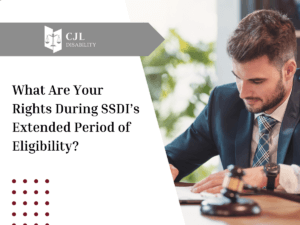Understanding your rights during the SSDI extended period of eligibility is crucial as you transition back to work. Our experienced SSDI attorneys explain.
Navigating the world of Social Security Disability Insurance (SSDI) can be complicated, especially when you are trying to go back to work. If you have completed your Trial Work Period (TWP) and are now entering the Extended Period of Eligibility (EPE), it is essential to understand your rights regarding your benefits.
The EPE is designed to help you smoothly transition back into the workforce while ensuring you continue receiving SSDI benefits if needed. This blog will summarize the key aspects of the SSDI extended eligibility period and what it means for you.
What is the Extended Period of Eligibility for SSDI?
The SSDI Extended Period of Eligibility begins the month after your Trial Work Period ends. Even if you are not working that month, the EPE still starts. The first 36 months of the EPE are considered the re-entitlement period. This period allows you to return to work without losing your benefits immediately, offering some financial security during the transition.
How Does the EPE Help You?
The Extended Period of Eligibility acts as a safety net, letting you continue receiving SSDI benefits while working, as long as your income stays below the Substantial Gainful Activity (SGA) level—the threshold the Social Security Administration (SSA) uses to determine disability status.
During the 36-month re-entitlement period, your benefits will resume automatically if your earnings fall below the SGA level. If your income exceeds the SGA limit, your cash benefits will be suspended for that month. This automatic reinstatement eliminates the need to reapply, unlike the Expedited Reinstatement (EXR) process, which applies under different rules.
What Happens When You Exceed The SGA Level?
If you earn above the SGA level for the first time during the EPE, the SSA will decide that your disability has “ceased.” You will continue receiving benefits for the month your disability ends and the following two months—known as the grace period. If your earnings drop below the SGA level during the re-entitlement period, your benefits can restart without reapplication.
After the 36-Month Re-Entitlement Period
When the re-entitlement period ends, your eligibility changes. If you are earning below the SGA level in the 37th month, benefits can continue. However, benefits will stop if your earnings exceed the SGA threshold or if you recover medically.
If you stop working after the re-entitlement period and your earnings drop again, you may qualify for reinstatement through the Expedited Reinstatement process, allowing you to regain benefits more easily within five years.
Your Rights During the EPE
While you are in the EPE, it is crucial to understand the rights that protect your benefits and ensure a smooth transition back to work. Some of your key rights during this period include:
Continued Benefits if Earnings Are Below the SGA Level
As long as your earnings stay below the SGA limit, you can continue to receive SSDI benefits, giving you a cushion while adjusting to working again.
Grace Period for Working Above SGA
The first time you work above the SGA level during the EPE, you get a grace period. You can still receive benefits for the month your disability ends and the next two months.
Reduction in Monthly Earnings
You can reduce your gross monthly earnings by deducting certain costs, such as paid time off, impairment-related work expenses, or work-based subsidies, which may help you stay below the SGA level and maintain your benefits.
Free Medicare Coverage
You can keep free Medicare Part A coverage for at least 93 months after your Trial Work Period ends. This coverage is crucial, as it allows you to maintain health coverage while transitioning back into the workforce.
Restart Your Benefits if Necessary
If you cannot work again due to your medical condition, you can request to restart your benefits through the Expedited Reinstatement process.
Let Us Help You Navigate the SSDI Process
The SSDI Extended Period of Eligibility provides crucial support during your transition back to work. If you are nearing the end of your Trial Work Period or need assistance understanding how the EPE works for your situation, our team can provide the guidance you need. Let us help you ensure you do not lose your SSDI benefits.
We focus on SSDI claims, denials, and appeals, offering clear guidance on your rights and options. Whether you need help getting benefits, addressing a denial, or navigating an appeal, our experienced attorneys are here to support you. Contact us today for a free consultation and take the first step toward protecting your benefits and future.

